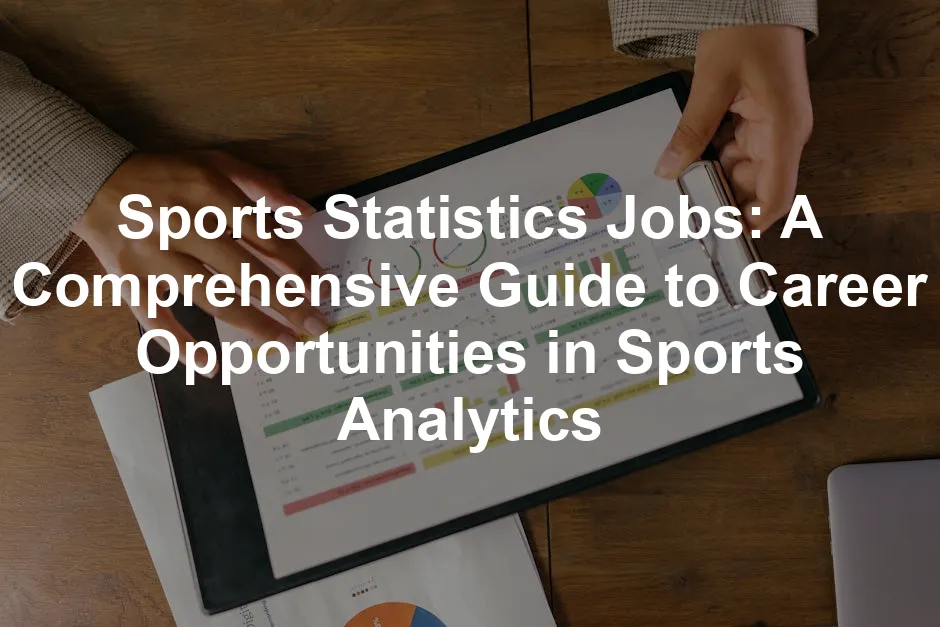Introduction
Sports statistics are transforming the game! They’re not just numbers anymore; they’re the secret sauce behind modern sports strategies. From football to basketball, teams are harnessing data to make smarter decisions. Remember the last time your favorite team pulled off a surprising victory? You can bet analytics played a role!
In today’s world, sports analytics has become essential. Coaches and managers rely on statistical insights to boost performance, scout talent, and even manage injuries. It’s like having a crystal ball that predicts game outcomes. As sports evolve, so does the demand for skilled professionals who can navigate this data-driven landscape.
This article will explore the exciting world of sports statistics jobs. We’ll cover various job types, the skills you need, educational qualifications, effective job search strategies, and upcoming trends in the field. Whether you’re a math whiz or a sports fanatic, there’s a place for you in this growing industry. So, buckle up as we dive into the opportunities that await in sports analytics!

Understanding Sports Statistics Jobs
What Are Sports Statistics Jobs?
Sports statistics jobs focus on analyzing data related to athletic performance. This field is critical as it helps teams understand player abilities, game strategies, and overall performance metrics. But what does this really mean? Simply put, it’s all about using numbers to tell stories.
Data analysts and statisticians play a pivotal role here. They gather, interpret, and present data in ways that enhance team performance. Imagine being the mastermind behind the scenes, guiding teams to victory with numbers! These professionals sift through mountains of data, finding trends and patterns that can make a difference in crucial moments.
For instance, during a game, every pass, shot, and tackle is recorded. Statisticians analyze this information, providing insights to coaches. They highlight which players excel under pressure or which strategies yield the best results. It’s like being a sports detective digging deep into the data files!
Moreover, the relevance of sports statistics extends beyond the field. Betting companies are increasingly hiring statisticians to build predictive models. Understanding probabilities can lead to big wins—whether on the field or at the betting table.
In a nutshell, sports statistics jobs are not only about crunching numbers; they’re about using those numbers to change the game. As sports continue to grow, so does the need for talented individuals who can leverage data in innovative ways. So, if you have a passion for sports and a knack for numbers, this could be your dream career!

To get a deeper understanding of how these analytics are shaping sports, consider checking out Sports Analytics: A Guide to Data-Driven Decisions in Sports. It’s a fantastic resource for aspiring analysts!
Types of Sports Statistics Jobs
Overview of Different Positions
The landscape of sports statistics jobs is diverse and growing. Here’s a quick rundown of various job titles that make up this intriguing field:
- Sports Statistician: These pros gather and analyze performance data. They’re the numbers wizards behind team strategies.
- Data Analyst for Sports Teams: Focused on player performance, injury predictions, and data-driven decisions. They ensure teams make informed choices.
- Salary Cap Analyst: They manage budgets and player contracts, ensuring teams stay within salary cap limits. Think of them as the financial gurus of the sports world.
- Scouting Analyst: They use data to identify new talent. Their work helps teams find the next big star before anyone else does!
- Statistical Recorder: Often seen at live events, they track statistics in real-time. They ensure accuracy and provide valuable data for later analysis.
- Personal Performance Analyst: These analysts work directly with athletes. They provide insights to optimize training and improve performance based on data.

Detailed Descriptions of Roles
Sports Statistician: Sports statisticians are the backbone of data analysis in sports. Their main responsibilities include real-time data collection during games. They prepare comprehensive reports and conduct statistical analyses. Their insights often guide coaching decisions and player evaluations. A sports statistician’s work is crucial for team strategies and performance enhancement.
Data Analyst: Data analysts focus on leveraging data for decision-making. They analyze player performance, track statistics, and develop injury prediction models. This role requires a keen understanding of sports dynamics and the ability to interpret complex data sets. Their insights drive strategic decisions, ensuring teams stay competitive.
Salary Cap Analyst: Imagine being the one responsible for a team’s financial health! Salary cap analysts manage budgets and navigate contract negotiations. They forecast player expenses and advise on roster decisions. Their analytical skills ensure teams can sign key players without breaking the bank.
Scouting Analyst: In the hunt for talent, scouting analysts play a crucial role. They analyze data to identify players who fit specific profiles. By leveraging statistics, they help teams avoid draft busts. Their work ensures that teams scout effectively and recruit promising athletes.
Statistical Recorder: Statistical recorders are the unsung heroes at live events. They track every stat, from goals to fouls, ensuring accuracy in reporting. Their real-time data collection provides essential information for coaches and analysts. This role requires attention to detail and a passion for the game.
Personal Performance Analyst: Ever wondered how athletes optimize their training? Personal performance analysts collaborate with coaches and trainers. They use data to enhance individual training regimens, focusing on improving performance. By analyzing metrics, they help athletes achieve their best.

In summary, sports statistics jobs offer a range of exciting opportunities. From analyzing player performance to managing budgets, each role is essential in the sports world. If you have a passion for sports and a knack for numbers, there’s a place for you in this dynamic field!
To further enhance your understanding, you might want to read Moneyball: The Art of Winning an Unfair Game. It’s a classic that dives into the numbers behind baseball!
Educational and Skill Requirements
Qualifications Needed for Sports Statistics Jobs
To land a job in sports statistics, you typically need a solid educational foundation. Most positions require at least a bachelor’s degree. Popular fields of study include Mathematics, Sports Analytics, and Sports Management. These programs equip you with the necessary analytical skills and sports knowledge.

Internships play a vital role in this field. They provide hands-on experience and help build a network of contacts. Many employers prefer candidates with practical experience. So, seek out internships with sports teams or analytics firms. This experience can set you apart from the competition.
In summary, a degree and relevant internships are essential for a successful start in sports statistics jobs. They help you gain the skills and experience needed to thrive in this dynamic field.
Skills Essential for Success
Success in sports statistics hinges on a unique blend of technical and soft skills. Proficiency in statistical software is crucial. Familiarity with tools like Python for Data Analysis: Data Wrangling with Pandas, NumPy, and IPython can give you a significant edge. These software programs enable you to analyze complex data sets and derive actionable insights.
Analytical thinking is another key skill. You’ll often face challenging problems that require innovative solutions. The ability to dissect data and draw conclusions is invaluable. Problem-solving skills will help you navigate the intricacies of sports analytics.

Moreover, strong communication skills are essential. You’ll need to present findings clearly and concisely to coaches and team management. Being able to translate complex statistics into understandable insights is a game-changer.
Lastly, a solid understanding of sports rules and analytical principles is vital. The more you know about the game, the better you can apply your statistical knowledge. By combining these skills, you’ll be well-equipped to excel in sports statistics jobs.

Job Search Strategies
How to Find Sports Statistics Jobs
Searching for sports statistics jobs can feel like hunting for a needle in a haystack. But don’t fret! With the right strategies, you’ll be on your way to a fulfilling career in no time. Here are some tips to jumpstart your job search:
Utilize Job Boards and Professional Networks
Job boards like LinkedIn and Glassdoor are gold mines for job seekers. You’ll find listings for various roles, from data analysts to sports statisticians. But don’t stop there! Create a compelling profile on LinkedIn. Connect with professionals in the field and showcase your skills. Engage with relevant content to increase your visibility.

Attend Sports Analytics Conferences and Networking Events
Networking is crucial in sports statistics. Attend conferences focused on sports analytics. These events offer an excellent opportunity to meet industry insiders. You can learn about job openings and gain insights into the field. Plus, who doesn’t love a good panel discussion?
Engage in Internships or Volunteer Opportunities
Internships can be your golden ticket. Many sports teams and organizations offer internships that provide hands-on experience. Even volunteering for local sports events can give you a foot in the door. These experiences not only enhance your resume but also help you build connections in the industry.
By combining these strategies, you’ll increase your chances of landing a sports statistics job. Stay proactive and don’t underestimate the power of networking!
Crafting a Winning Resume and Cover Letter
Your resume and cover letter are your first impressions. Make them count! Highlight your relevant skills and experiences. Tailor your resume for each application, focusing on what’s important for the specific role.

Include any experience with statistical software like R, Python, or SQL. Mention internships or projects related to sports analytics. If you’ve volunteered at events, don’t forget to showcase that too.
When crafting your cover letter, tell a story. Explain why you’re passionate about sports analytics. Share any experiences that shaped your interest. This personal touch can set you apart from other candidates.
Finally, keep your documents concise and easy to read. A cluttered resume or cover letter can overwhelm hiring managers. Aim for clarity and professionalism. With a well-crafted resume and cover letter, you’ll be one step closer to getting an interview!
Trends and Future of Sports Statistics Jobs
Growing Demand for Sports Statisticians
Hold onto your hats! The sports world is becoming increasingly reliant on statistics. Teams are not just playing games; they’re playing smart. Coaches now consult data analysts to make tactical decisions. The numbers are more than just stats; they’re gold mines of information.

With the rise of big data analytics, sports management has undergone a seismic shift. Technology is changing how teams operate. From player performance metrics to injury predictions, data is guiding every decision. Imagine a coach making a call based on real-time stats! It’s a game-changer.
Moreover, technology has made it easier to collect and analyze data. Wearable devices track player movements, while software analyzes performance trends. This allows teams to identify strengths and weaknesses quickly. The demand for skilled sports statisticians has skyrocketed. It’s no wonder that sports organizations are racing to hire experts who can make sense of all this data.
In fact, job listings for sports statistician roles are popping up everywhere. Organizations from the NBA to the NFL are searching for data specialists. If you’ve got a knack for numbers and an eye for sports, this is your golden opportunity.
Consider diving into resources like The Numbers Game: Why Everything You Know About Soccer Is Wrong. It provides insights that could reshape your understanding of the sport!
Future Job Prospects
The future of sports statistics jobs looks brighter than ever. Advancements in AI and machine learning are on the horizon. These technologies will enable deeper analysis of player performance and game strategies. Imagine algorithms predicting player injuries before they happen! The potential is staggering.

As data becomes more integral to sports strategy, job roles will evolve. Traditional roles like sports statisticians and data analysts will expand. New job titles may emerge, such as AI Sports Analyst or Predictive Modeling Specialist. The industry is ripe for innovation, and the demand for fresh talent will only increase.
Moreover, as sports organizations continue to embrace analytics, they’ll seek professionals with diverse skill sets. A background in technology, combined with sports knowledge, will be invaluable. Those who can bridge the gap between data analytics and athletic performance will thrive.
In summary, the future is bright for sports statistics jobs. As technology continues to reshape the landscape, opportunities will abound. The blend of sports and data will create exciting career paths for aspiring statisticians. If you’re passionate about sports and equipped with analytical skills, now is the time to jump in!

Conclusion
In this blog post, we explored the vibrant field of sports statistics jobs. We discussed the growing demand for sports statisticians and how big data analytics is revolutionizing the industry. The future holds immense potential, as advancements in AI and machine learning will continue to shape job roles.
The prospects for a career in sports statistics are promising. As teams increasingly rely on data-driven strategies, the need for skilled analysts will rise. If you’re considering a career in this field, now is the perfect time to start. Pursue relevant education, such as degrees in Mathematics or Sports Analytics, and seek internships to gain practical experience.

Don’t forget to network! Attend sports analytics conferences and connect with industry professionals. This will help you stay informed about job openings and industry trends.
Also, consider reading R for Data Science: Import, Tidy, Transform, Visualize, and Model Data. It’s an invaluable guide for mastering data analysis!
In conclusion, sports statistics jobs offer a unique blend of passion and profession. The sports world is evolving, and so should you. Embrace the opportunity, hone your skills, and be ready to make your mark in this exciting industry!
FAQs
What qualifications do I need to become a sports statistician?
To become a sports statistician, a bachelor’s degree in Mathematics, Sports Analytics, or a related field is typically required. Strong analytical skills and proficiency in statistical software are essential.
What is the average salary for sports statisticians?
The average salary for sports statisticians varies based on experience and role. Entry-level positions may start around $45,000, while experienced statisticians can earn upwards of $80,000 annually.
Are there remote opportunities in sports statistics?
Yes! The rise of remote work has opened doors for sports statisticians. Many organizations are now offering remote positions, especially in analytics roles.
How competitive is the job market for sports statistics?
The job market for sports statistics is competitive but growing. As more teams recognize the value of data analytics, the demand for skilled professionals is on the rise.
What resources are available for aspiring sports statisticians?
Aspiring sports statisticians can explore online courses, attend workshops, and engage with professional organizations. Books on sports analytics and statistical methods are also great resources to deepen your knowledge.
Please let us know what you think about our content by leaving a comment down below!
Thank you for reading till here 🙂
If you’re interested in pursuing a career in sports statistics, it’s essential to explore the various sports statistics jobs available today.
All images from Pexels




